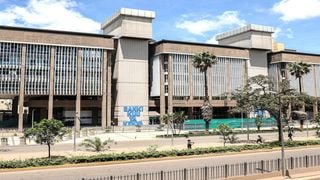
The Central Bank of Kenya in Nairobi County on January 28, 2024.
| File | Nation Media GroupBusiness
Premium
New Eurobond seen easing pressure on domestic debt interest rates
Kenya’s return to the international bonds market on Monday is set to relieve pressure on local lenders to finance the budget deficit for the current fiscal year, signalling a potential retreat in domestic debt interest rates that have climbed to 18 percent.
The Treasury is selling its first Eurobond since June 2021 when it floated a 12-year paper that raised $1 billion (Sh159 billion).
The surprise issuance marks a departure from earlier expectations that the Treasury would finance the planned buyback using the country’s forex reserves or proceeds from loans from multilateral lenders.
The inability to issue a Eurobond due to concerns over the cost of the debt has forced the government to lean on domestic lenders and multilateral sources over the last two years, with the higher demand for local cash pushing rates upwards.
“With the loans coming from the IMF, World Bank and the Trade and Development Bank (TDB), and now the potential overflow from the Eurobond, we expect reduced pressure on domestic borrowing. We could now start seeing rates trend lower because there is no pressure to fill the external borrowing gap,” said Churchill Ogutu, an economist at IC Group (Mauritius).
Analysts have therefore been expecting an upward revision on the net domestic borrowing target that currently stands at Sh451 billion, which would put additional pressure on rates.
The announcement of a refinancing plan for the Eurobond using the proceeds of the new bond has eased these worries, according to analysts.
“The risk of default that was playing on investors’ minds has also eased, meaning that we are likely to see a reduction on the risk premium on government issuances going forward… It might not be from the ongoing bond sale, but from next month this might start to reflect in the market,” Mr Ogutu said.
Last week’s decision by the Central Bank of Kenya (CBK) to increase its benchmark lending rate to a 12-year high of 13 percent to contain the stubborn inflation and stop the free fall of the shilling set in motion a new round of upward revision of interest rates by commercial banks, putting pressure on domestic rates.
The new rate will push interest rates for high-risk borrowers beyond 24 percent, with those already servicing bank loans and mortgages expected to take an immediate hit. Kenya Bankers Association (KBA), the banking sector lobby, has already called for a pause on CBK interest increases, warning higher borrowing costs could trigger greater credit defaults in the industry.
“Concerns in the credit market mainly include the deteriorating quality of loans and its impact on credit growth as well as provisions for expected credit losses going forward,” KBA says in a note. The high rates would also negatively impact the government, which is in the market borrowing heavily to plug revenue shortages.
This pressure saw the CBK plead with banks at a private meeting to shun aggressive bids in the ongoing infrastructure bond (IFB) sale in which the government is seeking Sh70 billion.
The IFB is on sale until February 14 and sources told the Business Daily that CBK governor Kamau Thugge is keen on avoiding rates above 19.5 percent in order to keep the cost of domestic borrowing in check.
Heavy principal repayments of external debt worth Sh633 billion in the current fiscal year—including the $2 billion (Sh318 billion) 2014 Eurobond that is now being refinanced partially through a buyback— further raised investor concerns about the government’s ability to meet its external obligations.
In the current year, the government expects to raise Sh363 billion in net foreign financing and Sh451.7 billion from domestic sources to fill its budget deficit of Sh814.8 billion.
The domestic target has undergone several revisions in the current fiscal year, reflecting the shifting expectations around external financing.
In the June 2023 budget, the government had set the target at Sh587.4 billion. The CBK said in August that the State was intending to slash this down to Sh316 billion, citing expected higher inflows from external lenders.
A Budget Review and Outlook Paper (BROP) published in September put the revised figure at Sh415.3 billion, but this new target was raised further to Sh474.5 billion in the first supplementary budget of the fiscal year, published in November.




